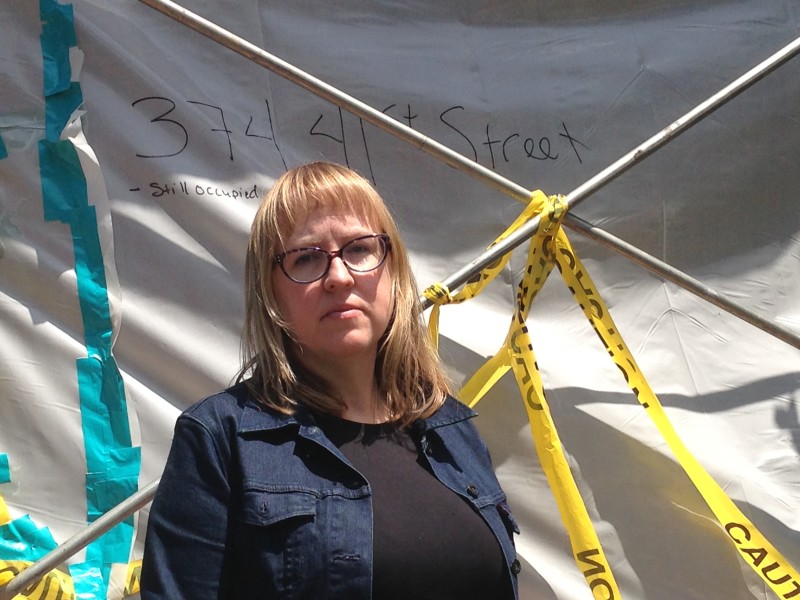Tenants rights advocates, as well as some city politicians, say pushing out rent-control tenants is a growing trend in Oakland. That’s because when a rent-control tenant leaves, landlords can raise rent as much as they want.
Hennings and the other tenants all pay less than $1,000 each month in rent. When new landlord Marty Higgins advertised the building’s one vacant unit, he asked for twice as much.
But Higgins, who's part owner of an investment group that purchased Hennings’ building, says he’s being completely misjudged.
“We have no intention of pushing out any of our residents whatsoever,” he says. “This is a case of a property that was in severe disrepair.”
Higgins acknowledges some mistakes have been made during the building’s renovation, but says he just wants to fix up the place and make it safe.
"Listening to your residents, hearing what they would like to have repaired and repairing that in a timely manner, that’s our main goal," he says. "Making sure their life safety issues are cleared up, that’s our goal."
What Is Illegal Harassment?
In November, the Oakland City Council passed a Tenant Protection Ordinance, which is intended to protect tenants from harassing behavior aimed at pushing them out. The law has 16 provisions defining harassment, including work that doesn’t meet code. It also guarantees tenants the right to quiet enjoyment of their homes.
Oakland’s building inspection manager, Timothy Low, says the number of mistakes he has found in Hennings' building -- largely as a result of her phone calls -- is more than average. “It’s a lot of mistakes,” Low says, stretching out the word "lot." More than the average number of mistakes, he says.
That doesn't necessarily violate the Tenant Protection Ordinance, though. And even if it did, it's hard for tenants to prove a landlord is harassing them.
Housing advocate James Vann of the Oakland Tenants Union says the law has “no teeth at all.” Vann’s group advocated for a law that would allow tenants to file a simple complaint to the city. But in the end, the City Council pulled that provision from the ordinance. Instead, tenants must file a claim against a landlord in civil court.
City Councilman Dan Kalb authored the law, and believes that with time it will help deter harassing landlords. But he acknowledges, “It might take one or two court cases to filter things out and get the message across.”
Vann says tenants call him all the time about their landlords harassing them. He often tells them they have a case. But he says, “Many of them, even educated people, will say, ‘It’s just too much hassle. I don’t want to go through it.’ ”
Headed to Court
During her standoff with the landlord, Melissa Hennings has changed as a tenant. Until the building sold, she says, she was laid-back and rarely contacted the previous owner. Now she’s a hawk, constantly scouring the building for code violations, firing off emails to her landlord and the city.
Higgins has offered to put Hennings and other building residents in an extended stay hotel while the work is going on. Two tenants have taken him up on the offer. But they both said it’s stressful not knowing when they’ll be allowed to come back to the apartment.
One tenant, who didn’t want to be named, recently decided to leave the extended stay and find a new place. She says she believes that’s exactly what Higgins wanted.
But again, Higgins says no. “I’ve dealt with hundreds of landlords over the course of my career," he says, "and I haven’t heard of too many cases of landlords offering extended stay during rather extreme renovations. We just think it’s the right thing to do.”
Hennings is determined to be the exception to the trend of tenants walking away from fights with their landlords. She has hired a lawyer and is expecting to sue.
She knows most people don’t have the time, energy or money to mount such a campaign. “I’m just doing as much as I can, because I know I’m in a better position that than they are,” she says.
Whatever happens in her own case, Hennings has no illusions that one law can temper the market forces bearing down on Temescal.
“I give this neighborhood only so long before investors come through and purchase more of these small apartments that a lot of my friends live in," she says, "before we’ll all get forced out of here."
